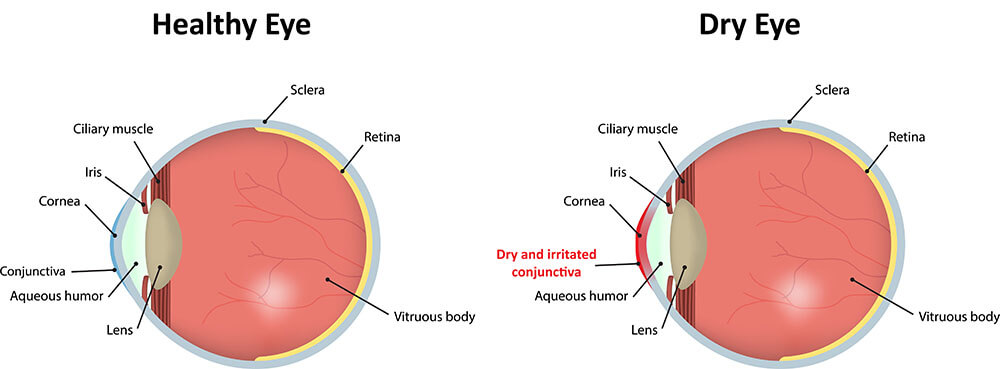
These are some signs of a common eye condition called dry eye syndrome. At Berg Eye Group, you’ll find that our eye doctors have the dedication and experience necessary to treat dry eyes and other eye conditions. For more than 60 years, we’ve been helping patients in Albany, GA, get the eye care they need.
Dry eye syndrome is a chronic eye condition that affects millions of people. To have healthy tears, you need to have a well-balanced tear. Tears have a tear film. The tear film has three components: water, oil, and mucus. If these components aren’t present, your tears won’t be healthy.

Dry eyes occur if your tears are low in quality, or the tears produced can’t properly lubricate your eyes. If you have dry eye syndrome, you may experience symptoms like:
At Berg Eye, we offer many different options for treating dry eyes. The best treatment option will depend on the severity of your symptoms and the root cause. Your eye doctor may recommend one or several of the following:
One of the first places to start if your eyes are dry is with lubrication and artificial tears. You can usually purchase artificial tears over the counter to help your tear film work more effectively.
Lubricating your eyes can help reduce feelings of irritation and dryness.
Warm compresses are beneficial if your eyes feel dry, itchy, or gritty. You can perform warm compresses with a warm washcloth or specialized eye treatment masks such as a Bruder mask.
Take the warm compress and place it over your eyes for five to ten minutes to experience immediate relief. Doing this a few times a week can make a difference, especially when paired with other dry eye treatments.
If you have more severe, lasting symptoms of dry eye syndrome, your ophthalmologist may prescribe a topical steroid or anti-inflammatory.
Steroids and anti-inflammatories can help reduce inflammation and irritation in dry eye patients.
Serum tears are eye drops derived from your blood that can be used to treat many surface eye conditions, including dry eye syndrome. Liquid and cellular components get separated from your blood to create a lubricating serum.
The serum makes the eye drop, providing relief from dry eye symptoms.
Inflammation along the edge of your eyelids, may prevent your oil glands from secreting healthy oil, which is necessary for proper tear function. Your eye doctor may prescribe oral medications to reduce this inflammation.
Omega-3 fatty acids may also help reduce dry eye symptoms.
Surgery may be necessary for patients with more severe, advanced cases of dry eye syndrome. These include:
A keratectomy is a procedure that smooths out or removes the outer layer of the cornea called the epithelium. Removing the epithelium can help improve dry eye symptoms, enhance eye comfort, and reduce chronic inflammation.
A keratectomy is an outpatient procedure that takes about 6-8 weeks to heal after undergoing.
An amniotic membrane graft uses amniotic membrane tissue, which is part of the placenta. The graft is placed on the cornea to help reduce inflammation and scarring while promoting healing in dry eye patients.
Tarsorrhaphy is a procedure that involves partially sewing the eyelids together. Sewing them together narrows the eye’s opening and allows it to retain much-needed moisture.
Tarsorrhaphy is a stabilizing surgical treatment, and is usually followed by other procedures to address any underlying conditions affecting the cornea or the eyelids.
Do you have dry eyes? Schedule an appointment at Berg Eye in Albany, GA, today!